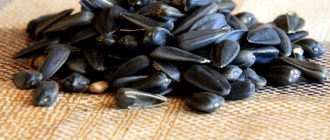It is known for certain that sugar is harmful to health. Nutritionists around the world have come to the conclusion that an excess of fast carbohydrates leads to instant weight gain. Nevertheless, giving up goodies based on this product is very difficult. The body requires a new “dose”, and the question arises of what to replace it with without harming the figure. Some nutritionists strongly recommend introducing a sweetener, but is it really that useful?
History of appearance
The sugar substitute was invented by accident, as a result of neglect of personal hygiene. This event happened back in 1879 in America, in a laboratory where the properties of coal tar were studied. A scientist of Russian origin, K. Fahlberg, after a very long day of work, was in a hurry home for dinner. He was so hungry that he did not even wash his hands, which were left with a chemical substance that changed the taste of the bread. It became unusually sweet.
The chemist did not at all wonder whether it was possible to lose weight if one replaced sugar with a sweetener; he simply decided to find out which component had such an impact on the characteristics of the product. To do this, he abandoned the meal and returned to his workplace, where he began to taste what was left in the laboratory container. Fortunately, there was nothing toxic there; it was possible to establish that this ortho-sulfobenzimide has a pronounced sweetness. Therefore, the substance was named saccharin.
The discovery came in handy not only in dietetics - people immediately realized that with the help of this component it was possible to reduce the calorie content of dishes - but also in the treatment of migraines and gastrointestinal disorders.
Subsequently, there was a lot of discussion about the health effects of this substance. Today, science has not found a direct connection between saccharin and diseases that are considered to be a consequence of its use. But just in case, its use was limited for the production of many groups of goods.
Possible consequences
When answering the question about why sweetener is harmful, you need to mention what diseases its long-term use can cause. The types of diseases depend on the type of sweetener used.
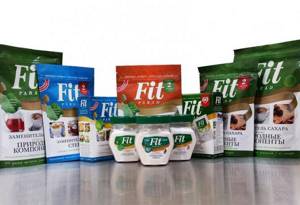
- Aspartame is the most popular sweetener. Its maximum harm or negative impact is manifested when added to tea. This compound breaks down at temperatures above 30 degrees into three components - formaldehyde, methanol and phenylalanine. The latter is toxic when consumed with proteins, and the first two are carcinogens in themselves. With regular use, nausea, headache, digestive problems, allergies, arrhythmia, and tachycardia occur. In addition, appetite increases, so the safety or benefit of such a remedy for losing weight is questionable;
- Suclamate is a strong allergen. Causes rashes, dermatitis, peeling and other skin reactions. There is no exact data on how much it needs to be consumed for a reaction to occur - this indicator is different for each person;
- Saccharin is a carcinogen that, theoretically, can cause cancer;
- Xylitol has a laxative and choleretic effect. Theoretically, it can provoke bladder cancer;
- Sorbitol is a powerful choleretic agent. This calls into question whether it can be used by people with gallstones, since the active flow of bile can cause their movement and blockage;
- Fructose disrupts the acid-base balance in the stomach. Despite the fact that when answering the question which sugar substitute is better, natural sweeteners are usually indicated, they also have contraindications. Fructose cannot be used for gastritis with acidity disorders.
In addition, there may be problems with the absorption of synthetic sweeteners and their elimination from the body.
What is healthier: sugar or sweetener?
There are a few things to clarify about substitutes (not to be confused with synthetic sweeteners):
- they still affect carbohydrate metabolism;
- have non-zero calorie content;
- require moderation in use.
It is important to understand that in pursuit of a sweet taste you cannot do without restrictions. You still have to count calories and eat desserts in moderation. It is best to use such components as a temporary measure while you find it difficult to completely give up sweets. It takes time to form good habits. And it is during this period, when you are most vulnerable and can break at any moment, that the diet can be supplemented with “snacks” with this analogue. It has the following advantages:
- lower glycemic index;
- presence of useful components;
- more pronounced sweetness, which helps you eat less of the substance.
Synthetic sweeteners
Artificial sweeteners contain no calories and still have a distinct sweet taste. Some of them are 300 times sweeter than sugar. Their entry into the oral cavity causes stimulation of the tongue receptors, which are responsible for the sensation of sweet taste. But, despite the zero calorie content, there is no need to get carried away with these substances. The fact is that with the help of synthetic sweeteners, a person deceives his body. He eats supposedly sweet food, but it does not bring satiation. This leads to severe hunger, which increases the risk of breaking the diet.

Are artificial sugar substitutes safe for health? There is no clear answer to this question
Some scientists believe that substances that are not absorbed by the body and, in fact, are foreign to it, a priori cannot be useful and harmless to humans. Also, many of the synthetic analogues of sugar cannot be used for preparing baked goods and hot dishes, since under the influence of high temperatures they begin to release toxic substances (even carcinogens).
But on the other hand, numerous clinical studies have proven the safety of a number of artificial sugar substitutes, provided the recommended dosage is followed. In any case, before using this or that sweetener, you should carefully read the instructions, study possible side effects and consult your doctor.
Aspartame
Aspartame is one of the most common sweeteners, but it is not the drug of choice for those patients who want to lose weight. It contains no calories and tastes good, but when it breaks down in the body, large amounts of the amino acid phenylalanine are formed. Phenylalanine is normally included in the chain of many biological reactions that occur in the human body and has important functions. But in case of overdose, this amino acid negatively affects metabolism.
The risk of obesity and metabolic syndrome in patients who frequently consume aspartame increases many times over. Despite the fact that this substance has zero calories, it significantly whets the appetite and negatively affects metabolism.
In addition, the safety of this sweetener still remains a big question. When heated, formaldehyde is released from this substance (it has carcinogenic properties, causes allergies and eating disorders). Aspartame, like other artificial sweeteners, is prohibited for use in pregnant women, children and debilitated patients.
This sweetener blocks an important enzyme in the intestines - alkaline phosphatase, which prevents the development of diabetes and metabolic syndrome. When you eat aspartame, the body feels a pronounced sweet taste (this substance is 200 times sweeter than sugar) and prepares to digest carbohydrates that are not actually supplied. This leads to increased production of gastric juice and disruption of normal digestion.
Scientists have differing opinions regarding the safety of this sweetener. Some of them say that its use occasionally and in moderation will not cause harm (provided that it is not subjected to heat treatment). Other doctors say that consuming aspartame significantly increases the risk of chronic headaches, kidney problems, and even the appearance of malignant tumors. This sweetener is definitely not suitable for weight loss, but whether or not to use it or not for diabetics who do not have problems with excess weight is an individual issue that needs to be resolved together with your doctor.
Saccharin
Saccharin is 450 times sweeter than sugar, its calorie content is 0 calories, but it has an unpleasant, slightly bitter aftertaste. Saccharin can cause allergies, rashes on the body, digestive disorders, and headaches (especially if recommended dosages are exceeded). It was also previously widely believed that this substance caused cancer in laboratory animals during research, but this was later disproven. Saccharin showed a carcinogenic effect on the body of rodents only if the weight of the sweetener eaten was equal to the body weight of the animal.
Today it is believed that in minimal dosages this substance does not have a toxic or carcinogenic effect. But in any case, before using the tablets, you should consult a gastroenterologist, because in patients with gastrointestinal problems, this supplement can cause an exacerbation of chronic inflammatory diseases.

Saccharin is not suitable for weight loss because it disrupts the functioning of the digestive tract
It weakens the action of many enzymes in the intestines and stomach, due to which the process of digesting food is disrupted and a person may experience heaviness, bloating and pain. In addition, saccharin disrupts the absorption of vitamins in the small intestine. Because of this, many metabolic processes and important biochemical reactions are disrupted. With frequent use of saccharin, the risk of hyperglycemia increases, so currently endocrinologists practically do not recommend this supplement for diabetics.
Cyclamate
Cyclamate is a synthetic sweetener that has no nutritional value and is ten times sweeter than sugar. There is no official evidence that it directly causes cancer or other diseases. But some studies have found that cyclamate increases the harmful effects of other toxic ingredients in food. It increases the activity of carcinogens and mutagens, so it is better to avoid this substance.
Glycemic index of fruits
Cyclamate is often found in carbonated, chilled drinks and can also be used in hot or baked foods because it withstands temperature changes well. But given that it is not always possible to know exactly the composition of the products from which food is prepared, it is better to replace this sugar sweetener with safer options.
Cyclamate soda has a bright sweet taste, but it never completely quenches your thirst. After it there is always a feeling of cloying in the mouth, and therefore the person wants to drink all the time. As a result, the diabetic drinks a lot of fluid, which increases the risk of developing edema and increases the load on the kidneys. In addition, cyclamate itself has a negative effect on the urinary system, since its benefits are excreted in the urine. It is also undesirable to use this supplement for weight loss, because it carries no biological value and only stimulates appetite, causes thirst and metabolic problems.
Main types of sweeteners
There are natural and artificial substitutes (the latter are more often called sweeteners). The first group includes:
Stevia
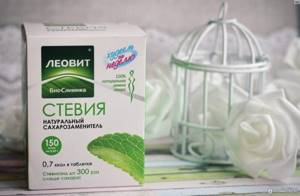
Produced from a plant, it has a beneficial effect on the body: it improves the functioning of the gastrointestinal tract, normalizes blood pressure, and thanks to the antioxidant content it helps maintain youth. This product is considered one of the safest in its group, so it is widely used in the diet. But there is bitterness in the taste, so not all gourmets are favorable towards “honey grass”. In addition, it should be remembered that leaves can be considered safe. But regarding the sweetener from stevia extract, everything is not so clear; the benefits and harm to the human body depend on the processing methods.
Nutritionist's comment:
The plant material itself does not contain any toxic components, its use has a positive effect (it has no side effects or contraindications). But to produce popular zero-calorie carbonated drinks, this plant is processed very carefully, using many chemical compounds in this process, including methanol, isopropanol, ethanol, and acetone.
Fructose
Obtained from fruits and berries. It is included in the diet of both healthy people and those who suffer from obesity and diabetes. This carbohydrate is indeed much less harmful than glucose, and besides, it is sweeter and does not cause a significant increase in blood sugar (which helps avoid the production of large amounts of insulin).
But moderation in the use of this product is still necessary. Its excess is transformed by the liver into fat; abuse will negate all weight loss results. Scientists even coined the term “metabolic syndrome,” which reflects the negative processes occurring in the body due to the consumption of large amounts of fructose.
Honey
This natural sweetener can be used when losing weight, despite its high calorie content (the energy value of the original substance is no more than 25% higher, and the glycemic index may be even lower, depending on the variety). But again, remember in moderation. The product belongs to fast carbohydrates and can lead to “carbohydrate hunger”, just like industrial sweets. The only advantage is that it contains useful components (vitamins B, C, microelements, phytoncides), that is, these calories cannot be considered empty.
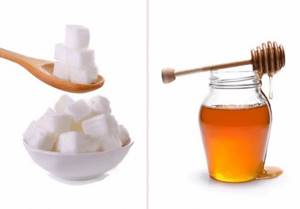
Sorbitol (labeled as E420)
It has a very low glycemic index - 9 (it is not a carbohydrate at all). Its calorie content is low - only 260 kcal. per 100 g, but in terms of sweetness it is inferior to regular sugar. This is one of the safest sweeteners for weight loss. Its advantages include:
- does not increase blood glucose levels;
- helps cleanse the liver and gallbladder, has a slight laxative effect;
- improves digestion;
- does not harm teeth, does not serve as a breeding ground for bacteria.
Nutritionist's comment:
You should not exceed the daily allowance of sorbitol - it is 16 grams. Otherwise, there is a risk of diarrhea. It is also important to remember that this product, although not a carbohydrate, still affects carbohydrate metabolism. Therefore, consult a specialist before including it on the menu.
How to choose a safe one
If the upcoming difficulties do not seem significant, and the weight loss diet allows for substitutes, you can go shopping. Knowing the characteristics of each of them, you can choose the most suitable product and determine the safe dosage.

Natural substitutes
They can be either full-fledged products or produced in the form of extracts. These include:
- Honey _ The most famous and popular alternative to sugar. It is very healthy, so consuming it will enrich your diet and be beneficial. You can eat one teaspoon a day without harming your figure. At the same time, it is better to combine it with the right carbohydrates (add to porridge or salad dressing) and not overheat.
- Stevia . A plant with very sweet leaves. It can be added to drinks and baked goods. But not everyone likes the specific “sugary” taste. It is available both in pure dry plant form and in the form of syrup, tablets or stevioside powder. Therefore, the permissible dosage varies and is indicated on the packaging.
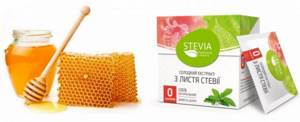
- Fructose . It is often called "fruit sugar". Helps stabilize blood glucose levels and does not harm teeth, but its calorie content is almost comparable to refined sugar.
The permissible daily dose of a pure substance during weight loss should not exceed thirty grams. It is worth taking into account the high level of its content in berries and fruits. And if you have to choose, it is better to give preference to fruits rather than “powder”, since along with them the body will receive vitamins and plant fibers necessary for normal digestion.
- Sorbitol and xylitol . These are naturally occurring sugar alcohols that participate in metabolic processes. They replace refined sugar if it is intolerable, but are not inferior in energy value. In addition, they can lead to stomach upset. Therefore, there is no “acceptable” dosage for them when losing weight, as for regular sugar.
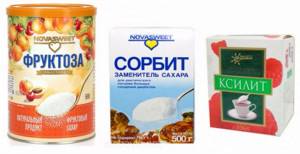
Synthetic analogues
They are sometimes added to sweet “diet” foods to reduce calories. And in the composition they are designated as “eshki”. The most common substances found are:
- E 950 . Its chemical name is "acesulfame potassium". It is very sweet and inexpensive, so it is often found in cheap products. It is difficult to call it harmless, since regular use causes allergic reactions and disrupts intestinal function.
- E 951 . “Aspartame” is most often used in confectionery products, since it was previously considered a complete analogue of natural sweeteners. Today, research notes its negative impact on the pancreas and its ability to enhance the growth of fat cells.

- E 952 . This substitute is “sodium cyclomate”. In small quantities it is considered harmless. But high doses lead to the appearance of malignant tumors, so it is banned in some countries.
- E 954 . Better known as saccharin, the substance is approved for use in diabetic products. However, you shouldn’t get carried away with it. It contains carcinogenic substances, large amounts of which cause bladder cancer.
Artificial analogues
The main advantage of products from this group is minimal or even zero calorie content. Let's take a closer look at the most popular of them:
Sucralose
It is practically not absorbed and is also unattractive to bacteria, so teeth remain out of danger. Diabetics, children, and pregnant women were able to appreciate the benefits of this sweetener in tablets; it does not cause harm, according to official data, since it does not raise sugar levels and is completely non-toxic.
But there are still concerns - many are wary of synthetic products. There is an opinion that the substitute still has a negative effect on health: it undermines the immune system and increases the risk of cancer. There is no confirmation of this information.

Aspartame (E951)
Much sweeter than granulated sugar and has zero energy value. But there is one circumstance that does not allow it to be used excessively - the sweetener, when entering the digestive system, forms methanol. People suffering from phenylketonuria, when asked what is the best sweetener in a diet and whether it can be consumed, will have to look for other options. In this case there is a contraindication. Its use is also not recommended for pregnant women.
Saccharin
A low-calorie and extremely sweet product (400 times sweeter than sugar), it has an unusual metallic taste. Excessive consumption may result in increased urination. There is debate about the harmful effects on the body, but at the moment there is no evidence that the sweetener can cause diseases.
Will it help you lose weight
When choosing sweeteners as an alternative to sugar when losing weight, it is worth considering that none of them is a complete and safe analogue. In diets and food systems where such replacement is allowed, the properties of these substances or products come to the fore, which can make the absence of a familiar ingredient less “traumatic”.
For example, the inclusion of high-calorie honey will be offset by its beneficial antioxidant properties, and synthetic substitutes will be offset by its low energy value. But in order for weight loss to occur as a result of a diet with such components, you will still have to control the volumes of permitted foods, portion sizes and frequency of meals.
We recommend reading about sweets when losing weight. You will learn about what sweets you can eat while losing weight, recipes for dietary dishes, and the results of losing weight. And here is more information about honey for weight loss.
Today, the desire to consume sugar is often compared to drug addiction. Therefore, the influence of this product on appearance should not be considered from a different perspective. If you have problems with excess weight, it is better not to disguise your refusal of the insidious “seducer” with synthetic substitutes. But when the parameters of the figure acquire the desired shape, you can pamper yourself with more useful natural analogues, while observing the permissible amount.
Benefits and harms
The main task of refined sugar substitutes is to reduce the calorie content of food. It is recommended to use them not all the time, but only from time to time, when you really want a treat and don’t have the strength to cope with this whim.
Which is better - sugar or a sweetener - is an individual question that should be discussed with a specialist. You can't ignore your sweet addiction and experiment with different sweeteners. They have contraindications and side effects, they affect carbohydrate metabolism and can disrupt normal glucose tolerance.
You won’t be able to deceive your body with impunity—it’s important to form healthy habits that will help you maintain normal weight. Until they are formed, you can carefully use less calorie analogs of granulated sugar.
5–8. The best natural sweeteners
There are a number of natural sweeteners that are often used by adherents of a proper, healthy diet. These sweeteners include coconut sugar, honey, maple syrup and molasses.
Despite the fact that these products contain a certain amount of useful substances, they are absorbed by the body in the same way as sugar.
Simply put, the following sweeteners are only slightly healthier than regular sugar. But still, these are just types of sugar.
Coconut sugar
Coconut sugar is extracted from the sap of the coconut tree.
It contains a number of beneficial substances such as iron, zinc, calcium, potassium and antioxidants.
Coconut sugar also has a low glycemic index compared to regular sugar, which may be partly due to its inulin content.
Inulin is a type of fiber that slows the rate at which glucose is absorbed.
However, coconut sugar contains the same amount of calories as regular sugar.
In addition, it contains fructose in fairly large quantities - the main reason why sugar is classified as harmful products.
Coconut sugar is not much different from regular sugar, so it should be used with caution.
Conclusion: Coconut sugar contains some fiber and nutrients. However, it is rich in fructose and is only slightly healthier than regular sugar.
Honey
Honey contains some vitamins and minerals and significant amounts of beneficial antioxidants.
The high content of antioxidants helps reduce the risk of a number of diseases.
One study found that when people with diabetes consumed honey regularly for eight weeks, their blood cholesterol and triglyceride levels were reduced.
In addition, it increases the level of “good” cholesterol. However, a number of studies have shown that honey also increases levels of a blood sugar marker called HbA1c, which is not beneficial for the body.
Another study found that eating honey reduced levels of C-reactive protein, which is a cause of inflammation.
Despite all of the above, all of these studies found that the negative effects of honey on blood sugar and metabolism are only marginally less than the effects of sugar.
Despite the fact that honey has a number of benefits, it contains fructose, which is the cause of many diseases.
Simply put, honey is the same sugar, just a little less harmful.
Conclusion: Honey contains antioxidants and small amounts of vitamins and minerals. It has a number of health benefits, but is still not significantly different from sugar.
Maple syrup
Maple syrup is a sweet, viscous substance obtained by heat treatment of maple sap.
It contains some minerals including calcium, potassium, iron, zinc and magnesium.
Maple syrup also contains at least 24 types of antioxidants.
A number of small studies that have yet to be confirmed have shown that maple syrup reduces the risk of cancer.
Despite all the benefits, this syrup contains a huge amount of sugar. Its glycemic index is slightly lower than the glycemic index of sugar, so your blood sugar will rise more slowly, but it will.
Like coconut sugar and honey, maple syrup is only slightly healthier than regular sugar, so you should eat it in small quantities.
Conclusion: Maple syrup contains a number of minerals and more than 24 antioxidants. It is a little healthier than regular sugar. But only a small amount can be consumed without harm to health.
Syrup
Molasses is a sweet, viscous, brown liquid. Molasses is obtained by boiling sugar cane or sugar beet juice.
It contains a number of vitamins and minerals, as well as antioxidants.
Molasses contains more antioxidants than honey and maple syrup combined.
In addition, the substances contained in molasses are beneficial for heart and bone health.
Molasses is a good alternative to refined sugar. But you shouldn't add it to your diet, as it is still a type of sugar.
Conclusion: Molasses contains substances that improve heart and bone health and helps regulate blood sugar levels. However, molasses is a type of sugar and should be used with caution.
Moderate consumption is considered beneficial
Why can't you constantly sweeten your food with a low-calorie additive? This would solve the problem of those with a sweet tooth who strive for a slim figure. It's actually not that simple. Taste buds that perceive the desired taste immediately signal the brain about this: “carbohydrates have entered the body.” Therefore, the body begins to produce the necessary enzymes for processing and assimilation of food (including insulin). Such insidious deception can cause:

- metabolic disorders - a sweetener does not work well for weight loss, as the metabolism slows down, and this is bad for the figure;
- increased appetite - the body begins to “demand” the promised food, this often leads to uncontrollable hunger.
Consult a qualified specialist about the use of substitutes - they are not at all as harmless as they seem.
Useful video
About sweeteners for diet and diabetes, watch this video:
Similar articles
- Chromium picolinate for weight loss: how to take drops...
Initially, chromium picolinate was not used for weight loss. It was needed for pre-diabetic conditions. Now it has become quite popular. How to take the drops? Will there be an effect? Read more - Black tea for weight loss: drink with milk, with lemon...
Surprisingly, black tea for weight loss will also help. You can drink it with milk and lemon. Special varieties have also entered the market, including Black Dragon, which can be purchased through special websites. Read more
- Diabetes and diet for weight loss: dos and don’ts...
If you have diabetes, a weight loss diet will help maintain insulin. It is important to understand how, whether and when not to lose weight with type 1 and type 2 diabetes. Read more
The most harmless options
It is better to use natural sweeteners, in particular stevia, as it has benefits and no harm. The only contraindication is individual intolerance.
Nutritionist's comment:
“Honey grass” not only helps satisfy sweet cravings, but also solves health problems such as absent-mindedness, poor sleep, heaviness in the intestines, and liver dysfunction. Unfortunately, not everyone likes its organoleptic properties. The taste is not at all similar to that of the usual mouth-watering desserts.
Who is not recommended to use natural sugar substitutes?
Even natural products may have contraindications. For example, sorbitol should not be used by people with the following conditions:
- fructose intolerance;
- urolithiasis disease;
- irritable bowel syndrome.
In some cases, its use leads to weakness, nausea, and dizziness.
Those who have food allergies, as well as people prone to overeating, should avoid fructose. The fact is that this sweetener is more harmful than sugar in its ability to provoke hunger. May lead to uncontrolled food consumption. Those suffering from diabetes are more often recommended to use synthetic sweeteners, which practically do not participate in carbohydrate metabolism. You should consult your doctor about using natural supplements.
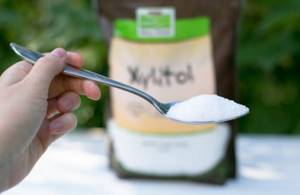
Natural sweeteners
Steviazid (stevia) is a natural sweetener that is 200-300 times sweeter than sugar and has a very low calorie content. It is extracted from the leaves of the stevia plant, which is considered to be native to Northern Paraguay and Brazil. According to numerous human studies, stevia is considered an absolutely safe and even healthy sweetener. Find out if this is true further.
Not widely used:
Neogrispedin is a natural , but VERY expensive sweetener , the sweetness of which is 3000 times sweeter than sugar.
Grycerizin (licorice) is a good natural sweetener , but has a very strong and unpleasant licorice taste.
Thaumatin is extracted from a South African fruit. Its production is VERY expensive, so its use in industry is practically never found.
Sorbitol is a natural sweetener , but at higher doses it causes a laxative effect.
What to look for when purchasing
If you can’t give up high-calorie desserts overnight and if, after studying the benefits and harms for a healthy person, you decide to use a sweetener, choose the safest one. The only product in this group that has no side effects is stevia. The rest should be used with caution and after consulting a doctor.
Look at our Clients' Acknowledgments and Success Stories - View
Remember, if you give up refined sugar, giving preference to fruits and berries, you will soon find that you no longer want to sweeten your dishes. Taste habits can be changed by methodically removing harmful treats from the diet. This strategy will help you achieve great weight loss results and stay healthy.
Which is better - natural or synthetic?
It is believed that natural sugar substitutes are healthier. They consist of natural components, so they do not carry a chemical load. The walls of the gastrointestinal tract absorb their components slowly, without causing sudden spikes in insulin and attacks of “hunger.” But using them during a diet for weight loss is not very advisable. Most of these products are very high in calories. Therefore, their quantity in the diet should also be limited.
Synthetic ones, on the contrary, contain only taste. With a minimum volume, their sweetness can exceed sugar by several hundred times. That is why they are most often produced in the form of small tablets, the weight of which does not exceed a few grams, and the energy value is 1 kcal. It should be borne in mind that chemicals only imitate the treat, irritating the corresponding receptors of the tongue.
After consuming them, the “deceived” body begins to release huge doses of insulin into the blood, expecting that it will be needed to process glucose. Without receiving it, an empty stomach will demand satiety.

Calorie content of natural sweeteners
In addition, there is an opinion that artificial sweeteners “block” the natural processes of carbohydrate processing. In other words, the feeling of hunger after eating them will not be satisfied. Regardless of whether a person begins to eat foods that are healthy and safe for the figure or indulge in “harmful” foods, the volume of portions will have to be increased several times, and everything eaten will immediately be deposited in problem areas.
Watch this video about the benefits and harms of sweeteners:



